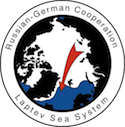 Task 1B
Task 1B
The shelf-edge system: influence of shelf processes on the Arctic Boundary Current (TRANSDRIFT XXIV, XXV)
Task B will focus on oceanographic processes in the northwestern Laptev Sea shelf, slope and Vilkitsky Trough region, which may be viewed as a hotspot for the interaction between polynya-formed dense waters, riverine freshwater, and warm Atlantic Water. Previous and ongoing studies suggest that a predominantly basinward circulation in Vilkitsky Trough may lead to episodic injection of freshwater near the surface and cold water at greater depth into the Arctic Ocean, and hence provides a cooling source for Atlantic Water at the slope. Further, freshwater pathways, dense-water formation and propagation and Atlantic Water up¬welling are relevant processes that control the vertical and horizontal dispersal of heat, fresh¬water and nutrients, and ultimately impact the Atlantic Water circulation and heat content. The task is designed to investigate the processes that have an immediate impact on the Arctic Boundary Current through ex¬change and mixing between water masses on the shelf and in slope regions.
The scientific outcomes are expected to provide answers to the following hypotheses: (a) a significant part of the Kara Sea freshwater exiting Vilkitsky Strait is lost to the Nansen Basin due to current instabilities and eddies, (b) dense water, formed on the shelf, is exported via Vilkitsky Trough to the Nansen Basin and cools the Atlantic Water, (c) strong Atlantic Water cooling occurs at the sharp front between Atlantic Water and cold shelf water in Vilkitsky Trough and at the slope, and (d) seasonal temperature variations are more extreme with further sea-ice reduction due to extensive summer warming and more effective polynyas in spring.
This task will rely on recent measurements and new data from the TRANSDRIFT XXIV and XXV expeditions planned for 2017 and 2018. One aim is to investigate smaller-scale features and processes, and shipboard measurements will hence focus on detailed hydrographic CTD (Conductivity Temperature Depth Meter) and water-sampling surveys, with a special emphasis on the strong fronts between shelf and basin, where enhanced mixing is expected. Mixing and vertical fluxes of heat and matter will be directly quantified with microstructure measurements. The previous operation of year-round ocean observatories was highly successful and will be continued. The design of the observatories will be extended by sophisticated methods for sampling near the surface in order to trace freshwater as well as to incorporate new techniques for moored ocean-turbulence measurements, which can be used to quantify vertical mixing. The AWI team will design, implement and analyze the oceanographic observations (see below for a detailed description of the research in Task 1B for which the CATS scientists apply for funding on the German side). AARI colleagues will provide support during expeditions and contribute to the analysis with historical Russian data. The GEOMAR team will provide a neodymium- and stable-oxygen-isotope-based assessment on the provenance and the sea-ice related modification of water masses. Task A focuses on previous and new observations from the central shelf and will be closely linked with Task B. Both tasks link with Task C to investigate ice/ocean interactions and to incorporate new observational findings into the numerical model setup.
Task coordinator |
|
| Markus Janout | Alfred Wegener Institute Helmholtz Centre for Polar and Marine Research |
Key collaborators |
|
| Dorothea Bauch | GEOMAR Helmholtz Centre for Ocean Research |
| Ekaterina Bloshkina | Arctic and Antarctic Research Institute |
| Martin Frank | GEOMAR Helmholtz Centre for Ocean Research Kiel |
| Jens Hoelemann | Alfred Wegener Institute Helmholtz Centre for Polar and Marine Research |
| Markus Janout | Alfred Wegener Institute Helmholtz Centre for Polar and Marine Research |
| Torsten Kanzow | Alfred Wegener Institute Helmholtz Centre for Polar and Marine Research |
| Georgi Laukert | GEOMAR Helmholtz Centre for Ocean Research Kiel |
| Mikhail Makhotin | Arctic and Antarctic Research Institute |
